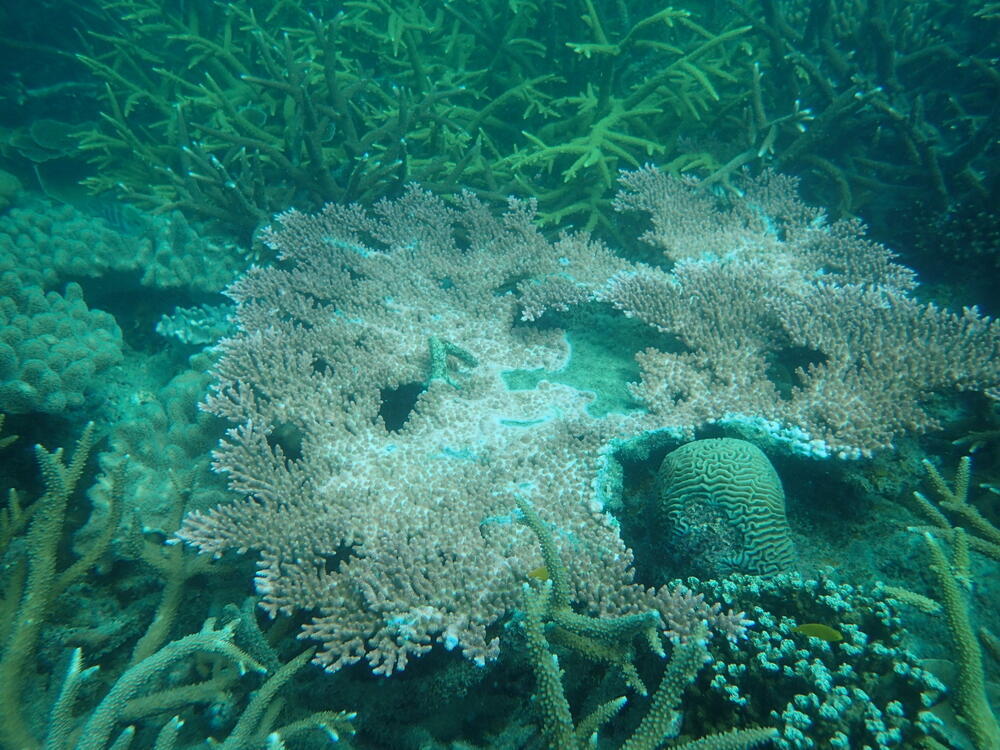Coral diseases are among the main factors contributing to the decline of coral reefs worldwide. In fact, coral disease outbreaks become more severe as global temperatures rise due to greenhouse gas emissions.
More Stories:
A study published in the Ecology Letters journal demonstrated the extent to which coral health is affected by climate change, which poses a threat to entire coral reef ecosystems and brings ruin to coastal communities.
To conduct their meta-analysis, researchers from New South Wales University in Australia analyzed 108 studies on coral health, in which different coral species were examined to attempt and find the symptoms of their illness.
They then correlated disease surveys with sea surface temperature records to understand how climate change, particularly ocean warming, has impacted the prevalence of coral diseases worldwide. They also developed models to predict future disease outbreaks in different global warming scenarios.
The researchers found that coral diseases have increased over time as ocean temperatures have risen, reaching 9.92% globally in the past 25 years. Moreover, their models predict a potentially alarming scenario, with disease prevalence potentially rising to 76.8% by the year 2100 if temperatures continue to increase.
Samantha Burke, the study’s leading author from New South Wales University’s School of Biological, Earth and Environmental Sciences, emphasized that the research’s findings highlight the destructive impacts of rising temperatures on coral diversity and the urgent need for swift action to mitigate climate change.
"Coral disease is a serious threat to coral mortality worldwide and poses a significant risk to many coral reefs. Our models suggest that this phenomenon will only worsen, even if ocean temperatures remain relatively stable," Burke said.
The research also indicates that coral disease is expected to get worse in the Pacific Ocean compared to the Atlantic or Indian Oceans, based on recent data. "Certain oceans are at higher risk, but it's difficult for us to determine if it's solely due to the rise in ocean temperatures or a combination of various factors that corals are dealing with,” Burke explained.
“What’s clear is that the prevalence of coral disease is increasing globally, so without urgent action aimed at addressing global warming, many more corals will be affected in the future," she added.
Coral reefs play a critical role in marine ecosystems, as they support a quarter of all fish species in the world.
They are also vital for coastal communities relying on reefs for fishing and tourism, as well as the protection they provide against storms and coastal erosion. "Corals are the builders of reef ecosystems. Without them, there would be no diversity and no beach industry," emphasized Burke.
Coral disease occurs when the coral’s immune system is compromised, usually after being infected by bacteria or fungi. This happens mainly due to a change in environmental conditions, such as temperatures rising.
"Certain diseases act faster than others, but most corals that are affected eventually die as a result. Since it takes a long time for coral reefs to recover, it’s possible the corals won’t heal, and significant portions of coral diversity will go extinct," Burke said.
Corals are sensitive organisms that require precise environmental conditions to survive, including water temperature, salinity, and quality. Living outside these ranges can stress corals, making them less capable of growth, reproduction and survival.
Regarding pathogens such as bacteria and fungi that ultimately cause coral disease, stressed corals become more susceptible to infection. An increase in water temperatures can also enhance the growth rate and virulence of disease-causing organisms.
"When the ocean warms, it increases the stress on corals, which can weaken their immune response. On the other hand, temperature increase may create more favorable conditions for the pathogens causing the disease," she explained.
One of the most common diseases among corals worldwide is Black Band Disease, which is the most studied, primarily occurring during the warm summer months. It is easy to identify due to the black bands that appear on the surface of the corals themselves.
"It’s still unclear whether the bacteria and fungi associated with diseased corals are the determining cause, or are merely symptoms of the disease,” Burke said.
“Only when the coral is in a state of decay can the presence of fungi or bacteria be observed, but it’s still uncertain whether they caused the disease or simply fed on the decaying tissue, so this requires more study in the field,” she added.
Burke also mentioned that additional research on coral diseases would help develop better conservation strategies for corals. "It’s reasonable to assume that the solution to coral disease is complex, but we don't have enough time to wait until a 'universal antibiotic' is found to solve the problem.”
“Considering the delicate what’s at stake, we must take swift action to develop effective mitigation strategies, with halting the sharp rise in temperatures being an excellent starting point," Burke concluded.





